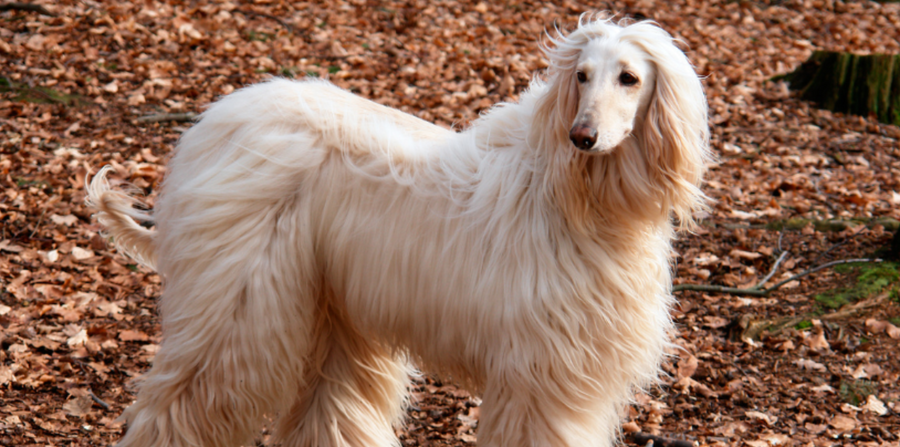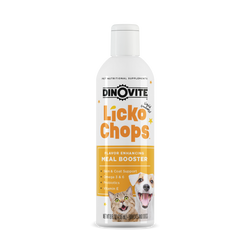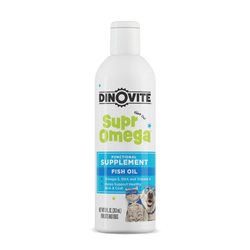How Dinovite Ingredients Support Skin and Coat Health for Dogs

A dog’s skin and coat reflect their overall health, but issues like dry skin on dogs, excessive shedding, and hot spots on dogs can disrupt their comfort and appearance. Many of these concerns can be addressed through proper nutrition, including key ingredients that support skin and coat health.
Let’s dive into the science behind the nutrients essential for healthy skin and coats, how they work, and how they can help with common dog skin conditions like dryness, itching, and hot spots.
The Science of Healthy Skin and Coat
Dogs need specific nutrients to maintain hydrated, resilient skin and a shiny coat. Deficiencies in key vitamins, minerals, and fatty acids can lead to:
- Dog dry skin: This can appear as flaky, rough patches or irritation, often linked to diet or environmental factors.
- Dog hot spots: Painful, inflamed areas of skin caused by excessive licking, scratching, or allergies.
- Excessive shedding or dull coats: Often related to poor nutrition or lack of proper grooming.
Nutrients like omega-3 fatty acids, zinc, and antioxidants play an essential role in keeping your dog’s skin and coat healthy and protected. Here's how these ingredients work.
.png)
Dinovite Ingredients for Skin and Coat Health
Zinc
Zinc is a mineral vital for maintaining healthy skin and shiny coats. It helps with:
- Skin healing and repair: Zinc strengthens the skin barrier and promotes cell regeneration, making it essential for addressing common issues like hot spots on dogs or dry, flaky skin.
- Immune system support: A healthy immune system helps protect against irritants that can trigger scratching or inflammation.
Dogs with zinc deficiencies often experience hair loss, crusty skin, and delayed healing.
Vitamin E
Vitamin E is a powerful antioxidant that protects the skin from damage caused by environmental factors. Its benefits include:
- Hydration: Vitamin E locks in moisture, helping combat dog dry skin and irritation.
- Elasticity: This nutrient improves skin flexibility, preventing cracking and rough patches.
-
Skin repair: Vitamin E soothes irritated areas, which can support recovery from conditions like dog hot spots.
Ground Flax Seed
Flaxseed is a natural source of omega-3 fatty acids, known for their anti-inflammatory properties and benefits to skin and coat health. Omega-3s:
- Soothe itchy skin: Reducing inflammation helps with conditions like dog skin conditions linked to seasonal allergies or diet.
- Improve coat quality: Omega-3s help create a shiny, soft coat while reducing shedding.
- Joint health: Beyond skin benefits, omega-3s also support mobility in active and aging dogs.
While fish oil for dogs is another excellent source of omega-3s, flaxseed offers a plant-based alternative for these essential fatty acids.
Prebiotics and Probiotics for Dogs
Gut health plays a major role in supporting skin and coat health. Prebiotics and probiotics:
- Reduce inflammation: A healthy gut microbiome lowers the body’s inflammatory response, which can reduce itching and irritation.
- Improve nutrient absorption: They help your dog’s body better absorb the zinc, vitamin E, and omega-3s that contribute to healthy skin and coats.
-
Strengthen the immune system: A balanced gut supports your dog’s overall immune health, helping defend against skin irritants and allergens.
Common Skin and Coat Problems in Dogs
Many dogs experience skin and coat issues at some point in their lives. While occasional scratching or shedding is normal, persistent issues may indicate deeper concerns. Here’s a breakdown of common problems and how they’re linked to nutrition:
- Dry Skin on Dogs. Dry, flaky skin can result from environmental factors (like dry air in the winter), hydration issues, or a lack of omega fatty acids in the diet. Adding omega-3-rich ingredients like flaxseed or fish oil for dogs can help restore skin moisture.
- Hot Spots on Dogs. Hot spots are inflamed areas of skin that often develop when dogs excessively lick or scratch an irritated spot. These can be triggered by allergies, insect bites, or poor skin hydration. Nutrients like zinc and vitamin E can support the skin’s natural healing process, reducing the likelihood of hot spots forming.
- Excessive Shedding or Dull Coats. If your dog’s coat looks lifeless or they’re shedding more than usual, it may signal a deficiency in essential nutrients like zinc, vitamin E, or omega-3 fatty acids. These ingredients nourish hair follicles and improve coat texture, helping to reduce shedding and bring back that natural shine.
- Dog Itchy Skin. Itchy skin can stem from a variety of causes, including diet, allergies, or environmental irritants. Omega-3 fatty acids and antioxidants like vitamin E help soothe inflammation and reduce irritation.
How to Get Rid of Hot Spots on Dogs
- Keep the area clean and dry.
- Address underlying issues like allergies or irritation with proper nutrition.
- Consult your veterinarian if hot spots persist or worsen.

Results of Proper Nutrition for Skin and Coat
When your dog’s diet includes the right balance of nutrients, you’ll notice improvements in their skin and coat health, including:
- Hydrated, moisturized skin: Omega-3s and vitamin E promote skin hydration and may reduce inflammatory responses.
- A soft, shiny coat: Zinc and fatty acids help hair grow strong and healthy, giving your pup that signature shine.
- Less shedding: Nutrient-rich diets help reduce excessive hair loss.
-
Fewer hot spots: Supporting skin resilience can prevent these painful, inflamed areas from developing.
Supporting Your Dog’s Skin and Coat
Skin and coat health starts from the inside out. By including key ingredients like zinc, vitamin E, ground flaxseed, and probiotics in your dog’s diet, you can help them maintain hydrated skin, a shiny coat, and overall comfort.
If your dog struggles with persistent skin or coat issues, consult your veterinarian for guidance on dietary changes and additional care.
*All information is for educational purposes only and is not intended to replace the expert advice of a veterinarian.
Related Products


